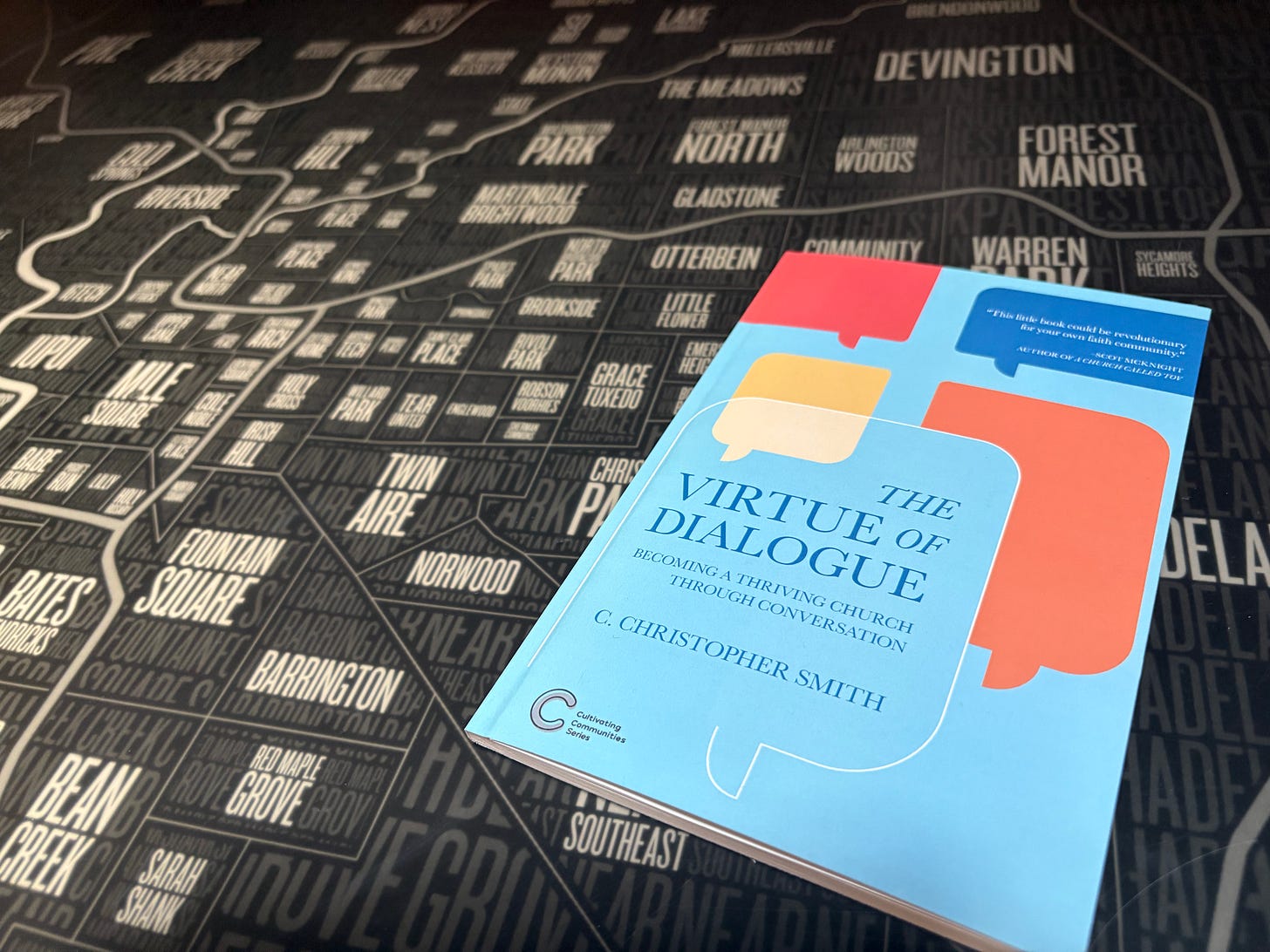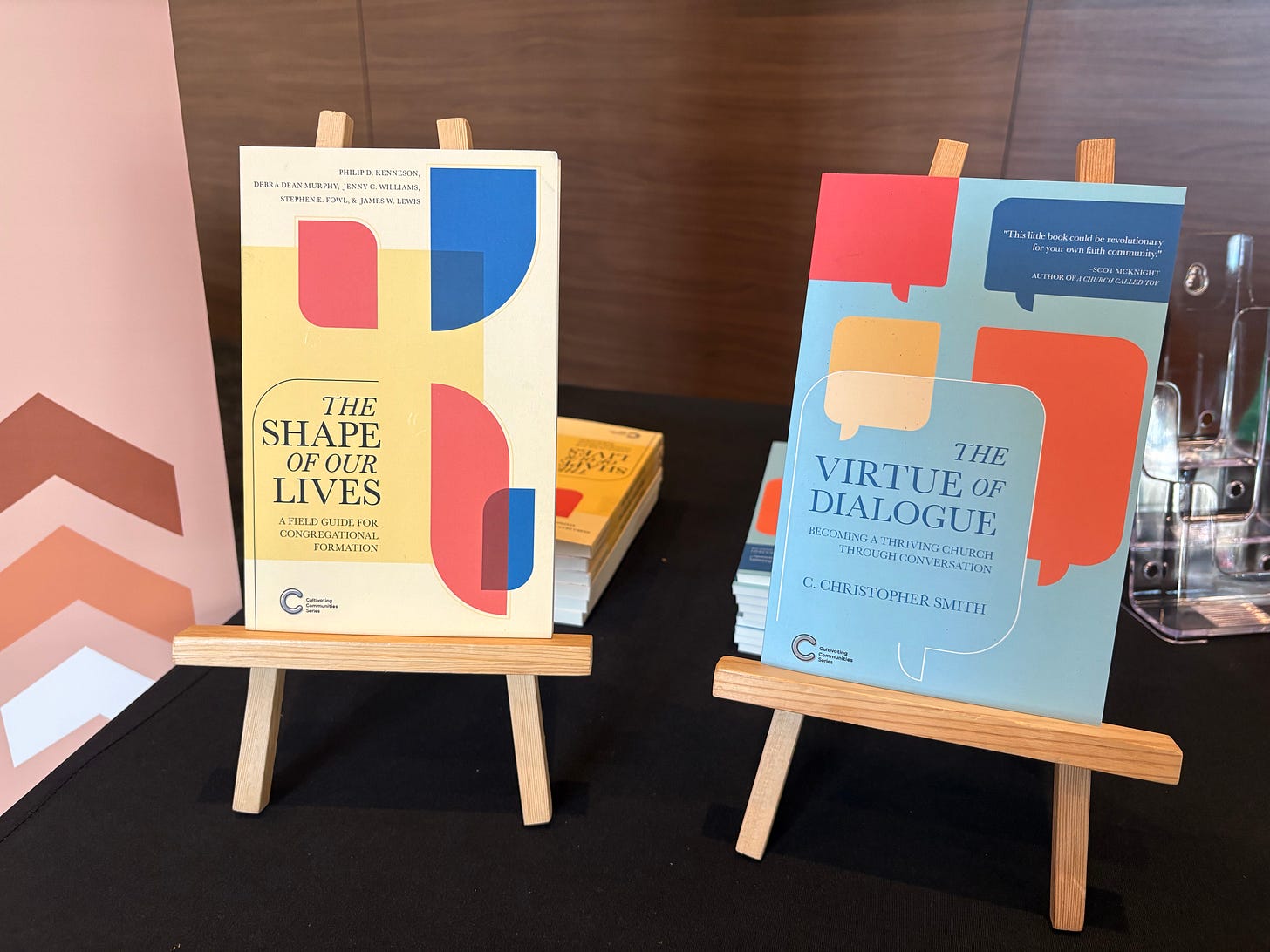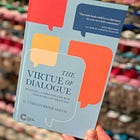Dear readers, we’re so happy to say that today, The Virtue of Dialogue is out in the world and heading to bookshelves everywhere! In this book, we’re hoping to start a completely different conversation (see what I did there?) about what it means for church communities to be together, talk together, and change into the image of Jesus together. The stories told in The Virtue of Dialogue demonstrate the transformative impact of one simple practice: conversation.
Grab your copy of the book here: Englewood Press | Amazon | Bookshop.org | Barnes & Noble | Apple Books and More
In the spirit of dialogue, today we wanted to share a Q&A with
. Chris is the primary voice behind this Substack, founding editor of The Englewood Review of Books, and author of The Virtue of Dialogue.Now, onto the Q&A:
This book has been revised and updated. Why did you decide to republish it now, in this particular moment in our society?
Many things are in upheaval right now for a good portion of Americans—such as Hispanic Americans, rural Americans, educators, and government employees—and things honestly haven't been all that great for years: 9/11 and wars that followed in its wake, a great recession, a global pandemic, and so on. And the nation is divided by widely divergent visions of how to calm these storms. I'm not sure there's much hope in trying to address them from the top down (in Washington or our state capitals for instance), but there might be a glimmer of hope in sitting in the same space with those who disagree with us and actually listening carefully to each other and trying to hear and understand one another, and starting to imagine what it means to belong together in our particular place. And this is, in essence, what our church did over 25 years ago, and we have been radically transformed by our commitment to sticking with this practice of talking together, week after week, year after year.
What was the size of your church when it adopted an intentional approach to conversation? How has it grown over the years?
We were under 200 members, and probably never had more than a third of that in any of our weekly conversations. Over a quarter of a century later, our church is probably still about the same size, and maybe even a bit smaller. The striking growth we've seen is not in numbers, but in the quality of our life together and of our care for one another. We've started businesses that employ church members and neighbors, and some have received awards at the state and national levels. In short, our practice of conversation has helped us to cultivate trust with one another that has helped us to grow closer together and to work better together as a church community.

What are some of the obstacles you encountered as you instituted this practice and how did you overcome them?
The biggest obstacle was simply that we didn't know how to talk together (and this was in the late 1990s, long before social media and all the other internet technologies that are usually blamed for polarizing and tearing people apart).
More specifically, a key part of our inability to talk together was that we assumed that everyone was working from the same definitions and interpretations and we rapidly found out that wasn't true! So, for lots of the common faith-based terms, like “gospel" or "salvation" or "word of God," we had multiple ways in which members of our church defined these terms, and that led to lots of frustration and disagreements.
In terms of getting around these obstacles, time was essential, which allowed us to know what a particular person actually meant when she used a specific term. Conversation didn't magically make us agree on definitions and interpretations, but it did help to reveal what people meant when they used a term and that gradually helped the discussion.
What advice do you have for church leaders hoping to help their congregation engage in beneficial dialogue together?
I think the biggest piece of advice I would offer is to be patient. Conversation is going to be messy, and it will be tempting as a leader to try to smooth things out when the conversation gets heated or awkward. And sometimes that smoothing is necessary, but if a leader is too quick to insert themself into a conversation, offering an opinion or trying to resolve tensions, that often serves to shut down and discourage others from participating. The best things you can do are 1) be a strong advocate for the practice of conversation and 2) do everything you can to encourage church members to stick patiently with the conversations even when they are frustrated with them.
What are some helpful questions for stimulating good conversation?
Although it's tempting to dive into the deepest, most divisive questions from the outset, our experience has been that we can tackle those harder questions better down the road if we start with questions that seek to highlight, with gratitude, all the goodness that is in and around our congregation. Simple questions like “Who are we?” and “Where are we?” and “Who are our neighbors in this place?” challenge us to pay attention to where God's goodness shows up.
Recently, at Englewood Christian Church, we've devoted a few weeks simply to going around and having each person (very) briefly introduce the work they do, and/or any other non-work passion that they devote a significant amount of time to. This has been a wonderful time of getting to know and celebrating all the people that God has gathered in our church.
How are conversation and hospitality intertwined?
Christian hospitality in its richest sense is about receiving another person as a gift of God. And conversation done well creates a space where this kind of hospitality can flourish, where all participants are seen, and heard, and valued, even if they are on the margins of the congregation (or even outside of it).
How can conversation lead to flourishing?
This is a really good question! God exists as trinity, three in one, and one in three, a community which easily could be understood as an eternal conversation, always attentive to the others in the community. The life that God intends for us, and indeed the life that God is, is conversational. Healthy relationships with others are navigated attentively in conversation, where no person forcefully imposes themself on another. We practice conversation here at Englewood because we desire this sort of flourishing, relational life in community.

ICYMI:
We shared an excerpt from the book last week—go grab a sneak peek into what the book is like:
Learn more about the Cultivating Communities Series and the vision behind it:
Grab a copy of The Virtue of Dialogue for yourself: Englewood Press | Amazon | Bookshop.org | Barnes & Noble | Apple Books and More
Thank you for all your enthusiasm and support of this book series so far!
Grace and peace!








